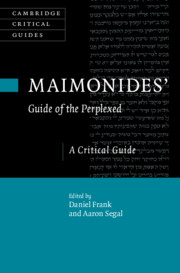Book contents
- Maimonides’ Guide of the Perplexed
- Cambridge Critical Guides
- Maimonides’ Guide of the Perplexed
- Copyright page
- Contents
- Contributors
- Introduction
- Part I Form
- Part II Human Beginnings
- Chapter 3 Paradise and the Fall
- Chapter 4 Maimonides on the Nature of Good and Evil
- Part III The Creator
- Part IV The Created
- Part V Human Finitude
- Part VI Human Ends
- Bibliography
- Index
- Cambridge Critical Guides
Chapter 3 - Paradise and the Fall
from Part II - Human Beginnings
Published online by Cambridge University Press: 18 June 2021
- Maimonides’ Guide of the Perplexed
- Cambridge Critical Guides
- Maimonides’ Guide of the Perplexed
- Copyright page
- Contents
- Contributors
- Introduction
- Part I Form
- Part II Human Beginnings
- Chapter 3 Paradise and the Fall
- Chapter 4 Maimonides on the Nature of Good and Evil
- Part III The Creator
- Part IV The Created
- Part V Human Finitude
- Part VI Human Ends
- Bibliography
- Index
- Cambridge Critical Guides
Summary
In the Guide of the Perplexed Maimonides offers innovative readings of biblical terms and narratives through which he reveals his philosophy. Since he does not compose a comprehensive commentary on the Bible, Maimonides includes biblical exegesis throughout his philosophic work by explaining philosophic issues within the biblical text, in an effort to resolve seeming contradictions between philosophy and a literal understanding of the Bible. In the Introduction to the Guide, Maimonides presents his dual objective: to explain obscure biblical terms and parables, or verses and passages that have an external (literal, conventional) and an internal (philosophic) meaning. Maimonides maintains that the Bible has an esoteric level of philosophic truth, accessible to the intellectually qualified, which he discusses in his Guide for the discernment of those capable of understanding. Influenced by Al-Farabi, Maimonides argues that religion defers to philosophy and the Bible presents educational myths in which images represent philosophical truths for the masses. According to Sara Klein-Braslavy, Maimonides views the Garden of Eden narrative as such a myth reflecting “philosophic anthropology rather than historical narrative.” In his discussion of the episode in the Garden of Eden, Maimonides explores the human condition before and after the transgression and fulfills both objectives of his philosophic work by explaining an equivocal term and the figurative meaning of the sin and sinners in the parable – an explanation that is critical for a correct philosophical understanding of the challenging narrative.
- Type
- Chapter
- Information
- Maimonides' Guide of the PerplexedA Critical Guide, pp. 51 - 59Publisher: Cambridge University PressPrint publication year: 2021

